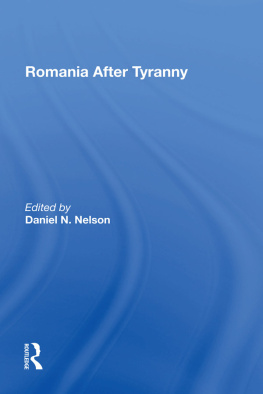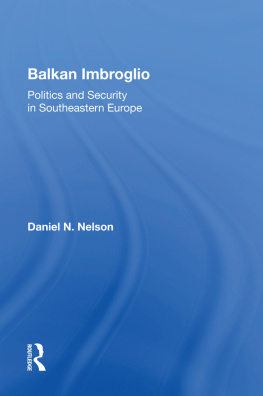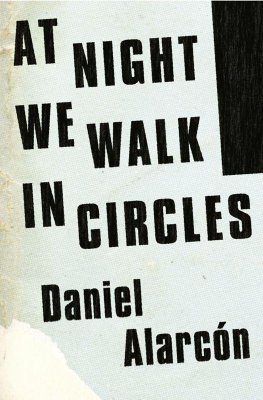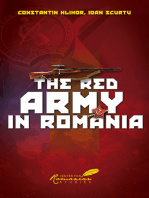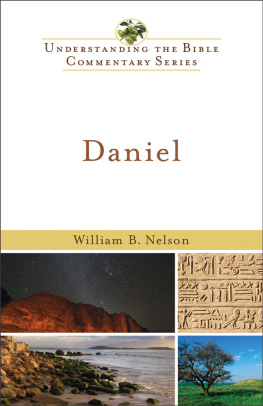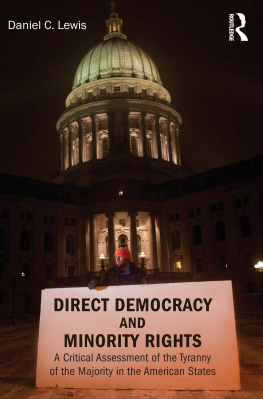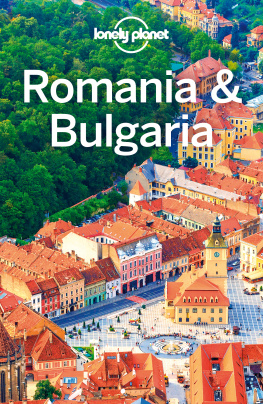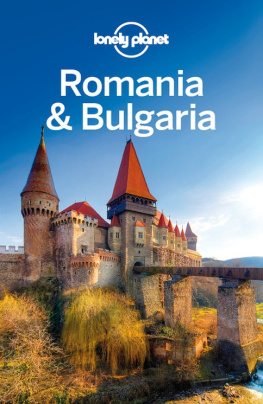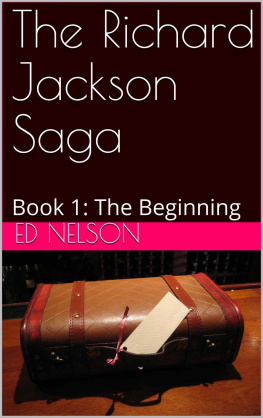Romania After Tyranny
First published 1992 by Westview Press
Published 2019 by Routledge
52 Vanderbilt Avenue, New York, NY 10017
2 Park Square, Milton Park, Abingdon, Oxon OX14 4RN
Routledge is an imprint of the Taylor & Francis Group, an informa business
Copyright 1992 Taylor & Francis
All rights reserved. No part of this book may be reprinted or reproduced or utilised in any form or by any electronic, mechanical, or other means, now known or hereafter invented, including photocopying and recording, or in any information storage or retrieval system, without permission in writing from the publishers.
Notice:
Product or corporate names may be trademarks or registered trademarks, and are used only for identification and explanation without intent to infringe.
Library of Congress Cataloging-in-Publication Data
Romania after tyranny / [edited by] Daniel N. Nelson.
p. cm.
Includes bibliographical references and index.
1. RomaniaHistory1989. I. Nelson, Daniel N., 1948
DR268.R66 1992
949.803dc20
91-26080
CIP
ISBN 13: 978-0-367-28619-4 (hbk)
Contents
, Harry Barnes, Jr.
PART ONE
Domestic Issues: The Difficult Path to Democracy
, Matei Calinescu and Vladimir Tismaneanu
, Mary Ellen Fischer
, David A. Kideckel
, Trond Gilberg
, Larry L. Watts
, Petre Datculescu
, Mugur Isarescu
PART TWO
Foreign and Defense Policies: Finding Security in the New Europe
, Daniel N. Nelson
, Walter M. Bacon, Jr.
, Ronald H. Linden
, William Crowther
, Sorin Mircea Botez
, Ioan Mircea Pascu
, Daniel N. Nelson
Guide
In 1973, Romanians were beginning to recognize that the regime of Nicolae Ceausescu, contrary to what his first five or six years in power seemed to imply, would bring no respite from communism. Instead, after a 1971 mini cultural revolution ended hope for a Bucharest spring and intellectual latitude was curtailed further in 197273, the ominous possibilities of Ceausescu were becoming evident.
In 1973, I went to Romania on a dissertation research grant from the International Research and Exchanges Board. It was a year in which wide-ranging survey research was still possible. But it was also a time when historians and writers who had different ideas, or workers who gave thought to non-party union organization, felt the heavy hand of Ceausescus Securitate. As happens to most graduate students and their field research, it was a formative experience with indelible impressions that remain today.
Since then, several of my books have focused on Romania, and I retain an affinity with the people and culture that is difficult to describe. I know that I share the same sentiment with many other non-Romanian scholars and analysts who have come to know this complex nation.
In late December 1989, I watched and waited with many Western observers to hear from afar the outcome of a phenomenon that I feared would never occura revolt against Nicolae Ceausescu and the end of his tyranny. By early 1990, when many Americans and West Europeans were able to return to Bucharest or other parts of Romania, the glorious moments of December had already begun to fade, and many of Ceausescus legacies were beginning to weigh heavily against the countrys post-Communist transition.
After several trips to Romania in 1990, I became convinced that the Western rendering of Romanian events was grossly incomplete and skewed toward sensationalism. I contacted a number of scholars in the United States, Western Europe, and Romania regarding a volume that would offer broad assessments of the countrys domestic and international conditions in the aftermath of revolution. Events moved quickly, and some of those individuals I had contacted were unable to contribute, whereas articles that were submitted had to be reassessed in light of changing circumstances.
Nevertheless, by the fall of 1991 all chapters that are published herein were completed. The authors, of course, bear no responsibility for the subsequent delay imposed by my service in an advisory role within the U.S. House of Representatives.
Susan McEachem at Westview Press was patient and supportive. Important assistance was provided to me by Liz Jasper, a staff member of the Carnegie Endowment, and by Debra Liang, the production editor for the Journal of Democraqj at the National Endowment for Democracy. Both Ms. Jasper and Ms. Liang were extraordinarily helpful in the preparation of this book.
first appeared in the Mediterranean Quarterly (Spring 1992). Acknowledgments are due to both journals.
Daniel N. Nelson
Washington, D.C.
Harry Barnes, Jr.
I paid my first visit to Romania in the summer of 1967. Assigned to become deputy chief of mission (DCM) of the American embassy in Bucharest, I was on my way home from Nepal to Washington where I would be studying Romanian. Although my assignment had not formally been announced, my predecessor-to-be kindly helped me get an initial sense of the country as a visitor during the few days that I was there. Actually, even before leaving Kathmandu, I had confided to one diplomatic colleague who I knew had served in Romania that I was being assigned there and asked his opinion. He told me Romanians were sharp, that they were hard bargainers, and that Id need all my wits about me to deal with them.
It was only after I had begun to study the language that I learned the word smechar which covers some of what my friend was trying to express. Smechar means clever if you like the characteristic, or crafty if you do not. By the time my family and I left Bucharest in November 1977, after two assignments there, first as DCM and then, after a three-year pause, as ambassador, I had learned that there were a lot of clever Romanians. We had also come to know a lot of extraordinarily hospitable and generous people as wellfeatures that were all the more remarkable given the restrictions then imposed on contacts by Romanians with foreigners. I had also seen the destruction of what appeared to be in 1968 an opening of Romania to the rest of the world and of the society within Romania. All of these hopeful processes were, between the late 1960s and late 1970s, stopped and then strangled.
We had arrived at the old airport at Baneasa on a Friday night in August 1968. At that moment, almost literally, Ceausescu and Dubcek were meeting in Prague to offer each other support in their efforts for greater autonomy from the Soviet Union. On the following Monday, the Czechoslovak Prague Spring collapsed under the weight of the Soviet invasion. Ceausescu was back in Bucharest and that morning in the square between the palace and the Central Committee building, gave what was probably his best speech ever, if only because it was so short. I was in the crowd and, both then and in the ensuing week, one felt a genuine sense of defiance of the Sovietsalmost a dare that they take on Romania too (but considerable relief when they did not). Ceausescus condemnation of the Soviets over the invasion brought into the Communist partys ranks people who were earlier strong opponents but who now thought that the lot of the people within the country could be transformed with equal zeal.
Ceausescu fled from a balcony overlooking that same square on December 21, 1989 when a supposedly obedient crowd assembled by the Party began to shout against him. A few days later he had been executed. In the late 1960s, and much of the 1970s when we were in Romania, it was still possible to hope that things would get better within the country. There were periods when it was relatively relaxed, when it was possible to travel, when it was easier to put on plays with some social criticism or to write a somewhat daring literary review. Yet, these were periods that were inevitably and almost rhythmically, succeeded by other periods of more overt pressurerefusals of passports, increased censorship, intimidation and harassment.

